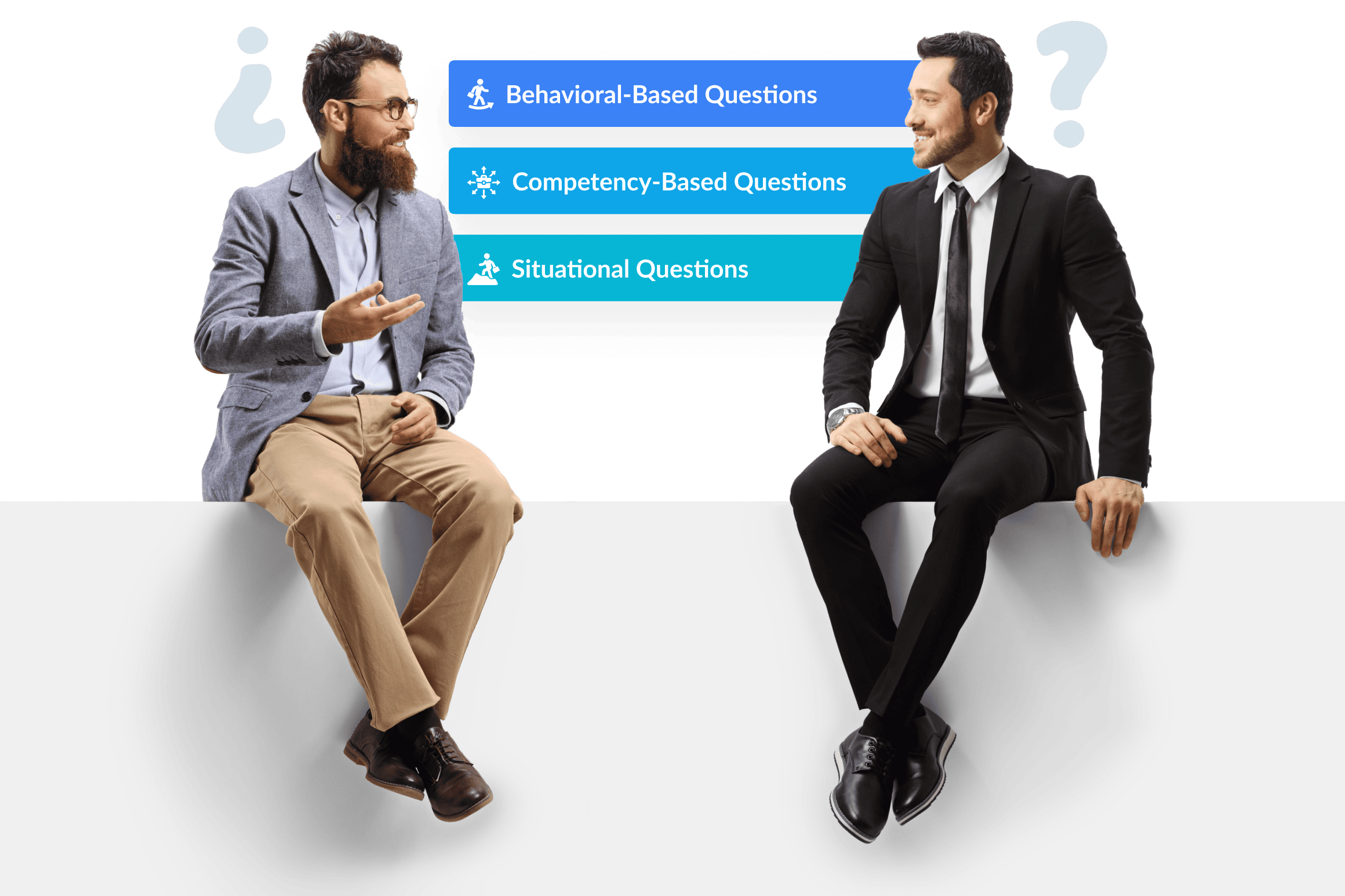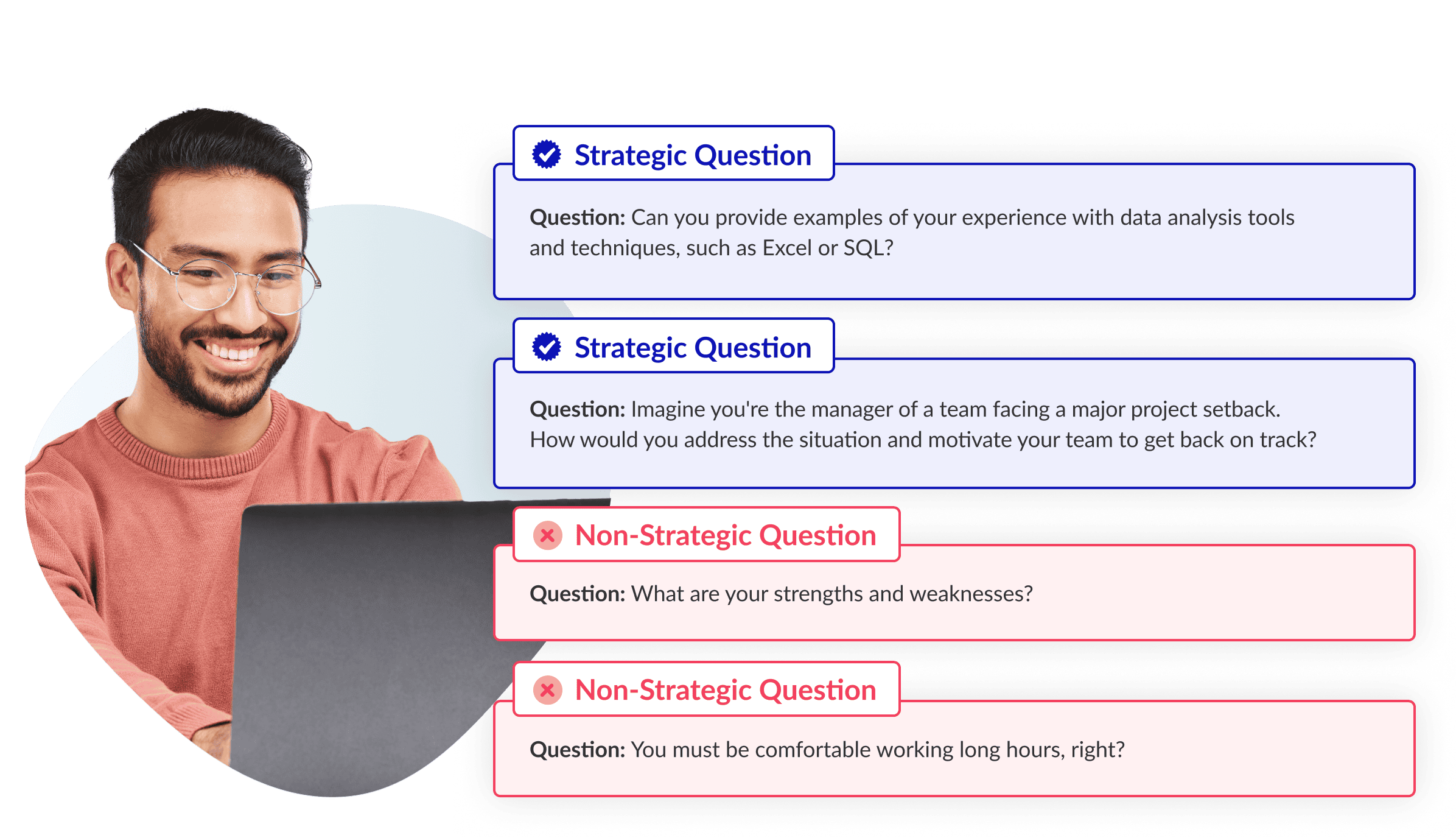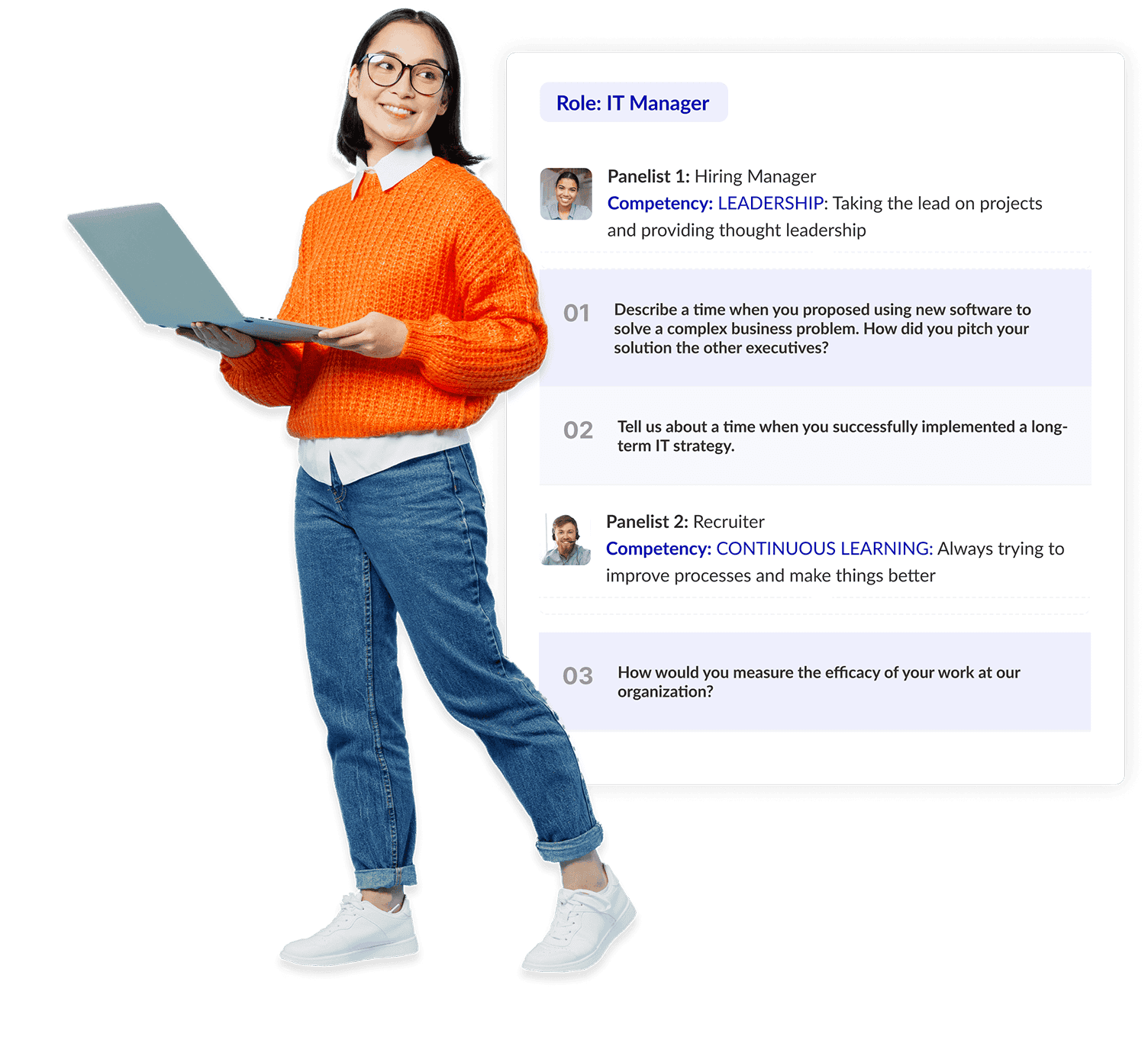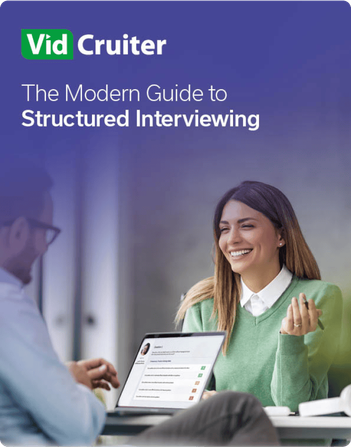
Promote Accessibility With Pre-Recorded Interviews
Learn how pre-recorded interviews can enhance diversity, inclusivity, and accessibility in your hiring process.

When hiring, carefully select the interview questions to ask candidates. They can significantly impact candidate experience and predict future job performance. The right questions will help you assess key competencies directly related to the position and determine if the candidate aligns with your organization’s core values.
The type of interview you are conducting shapes the questions you ask. Structured interviews require preparation and precision, but they are the best way to predict job performance (CQ Net). If you conduct structured interviews, you’ll have a list of competencies to inform your questions and some that are standard across the organization.
Unstructured interviews are improvisational; interviewers can ask whatever they want, and the questions may not always be job relevant. They are not prepared or approved in advance, increasing the possibility that the interviewer will ask bad interview questions.
What are competencies?
Competencies are the characteristics (including knowledge, skills, and abilities) that underlie effective job performance and are linked to the organization’s objectives and issues. For example, integrity is a competency, and communicating with integrity would be the behavioral indicator of that competency.
The Government of Canada recommends assessing for no more than seven competencies per interview.
The main objective of an employment interview is to evaluate a candidate’s suitability for a role. Different questions collect distinctive information that can help or hurt your evaluation.
Slightly rewording a question can lead to an alternate answer — this is why understanding question types and being intentional with your language is very important. There are three main types of questions to ask an interviewee.

Behavioral-based interview questions explore how a candidate acted in past professional situations. They can help you determine if the candidate has exhibited, and will continue to exhibit, the specific behaviors you’re looking for. They are the most common type of interview question.
Example: Can you share a time when you were confronted by an unhappy customer? What did you do?
Competency-based interviews focus on several aspects of the job, giving the candidate the opportunity to demonstrate their capacity to respond to relevant incidents.
Competency-based questions assess specific qualifications. If you ask a competency-based question, the candidate’s strengths and weaknesses will come through in their answer, allowing you to see if they meet your role requirements.
Example: Tell us about a time when you used your customer service skills to resolve an issue with an unhappy customer.
Situational interview questions help determine how candidates will react to situations they may face on the job in the future.
A candidate could incorporate a situational element in response to a competency-based or behavioral question by sharing what they learned from the experience or what they would do if they were faced with the same situation again.
Example: What would you do if an unhappy customer confronted you?
Open vs. close-ended questions
Open-ended questions are most commonly used in interviews and require the interviewee to elicit a more dynamic or in-depth response. According to HubSpot, starting with why, how, or what can help.
Close-ended questions are answered with a single word and are used to collect straightforward information from the interviewee. Knockout questions are often close-ended.
There are bad questions (irrelevant or overused) that go against best practices, and there are illegal ones. While the laws around interviewing may differ depending on where you are, there are several things you should never ask about to prevent opportunities for bias.
Even if you’re asking a personal question innocently to build rapport, it can land your organization in a lawsuit. Remember: you are trying to gather information directly related to the job, not trying to get to know the candidate.
It is illegal to ask a candidate about any of the following topics:
Pregnancy discrimination is a problem
In an August 2019 survey of 2,500 women, 25% reported that they’ve been asked in an interview if they have children, and 28% say they’ve been asked about their marital status (InHerSight). Despite the protections in the US (the Family and Medical Leave Act and the Pregnancy Discrimination Act), women who decide to become mothers face an uphill battle in continuing to assert their value in the workforce.

Strategic questions keep in mind your hiring objectives and are well-aligned with your overall interview strategy. Any type of question can be strategic, but most often, they are open-ended. They can be a good way to determine a candidate’s ability to perform the role, and determine what the candidate is best at. They are also used to assess alignment with organizational values and goals.
Structured questions are highly strategic. The questions are prepared in advance to ensure they are aligned with the hiring objectives and job description, and the interviewer follows an interview guide so they ask them in the correct order.
If you were hiring for a dental assistant position at a busy clinic, a strategic question might be, “what would you do if you had to juggle helping multiple patients at once?”
Discover the importance of question selection for structured interviews

Unique questions offer candidates the chance to demonstrate their ability to think outside the box, which is highly relevant for some jobs, but completely irrelevant for others. Ask these with an abundance of caution, as they can have the capacity to make candidates question the professionalism of the interviewer and the organization they represent.
Asking a unique or quirky question is not a recommended practice because it can unnecessarily invite implicit bias. Even Laszlo Bock, the former senior vice president of people operations at Google, even admitted that far-fetched brain teasers are pointless because they aren’t predictive (The Atlantic).
If you ask a unique question, it should be relevant to the job or organization.
For example, it would make sense to ask a unique question if you were hiring for a role where the successful candidate needs to be creative. If you were hiring for an art director role, the unique question could be, “if you were a color, what color would you be and why?”

The case for unusual questions
In a Strategy+Business article by Adam Bryant he says unusual questions allow you to “peek behind the facades that people present in interviews, so it’s easier to find out what really makes them tick. He suggests the following “bank-shot questions”:
If someone is in a first-round interview, it means their application or resume met the minimum job requirements. First-round questions allow you to get a basic understanding of the candidate’s skills and experience and confirm if they have the qualifications necessary to perform the role.
First-round questions can also help the hiring team identify candidates who have the potential to make it to the shortlist right away.
Knockout questions make good first-round inquiries because they are the most efficient way to find qualified candidates to advance in a large pool of applicants.
Say you’re recruiting for a position that requires someone to be an advanced Microsoft Excel user. You need a question that will help establish the candidate’s skill level. If you weren’t planning on doing a skills test, you might ask, “can you explain what a pivot table is and touch on a few ways you may use pivot tables in this role?”
After the first interview, you know the candidate can fulfill the job's basic requirements and learn a little about their skills and experience. Second-round questions are much more involved and help the hiring manager discover which candidates stand out.
Second-round questions go deeper to differentiate between candidates with similar knowledge, skills, and abilities. These will give you an idea of how the candidate applies their skills and greater insight into their personality, strengths, and weaknesses.
Generally speaking, it’s ideal to make the second interview a panel interview and assign each interviewer a question or two to cover different competencies.
If you’re hiring for a position where the person needs to be able to work independently and manage their workload, you might ask, “how do you stay organized?” A probing question might be, “can you give me a recent example of when you used your organization skills?”

This interview gathers the last bit of information that enables the hiring manager to select the best person from a small group of highly qualified candidates.
These questions should draw out minute differences and answer two things:
If an organization is very focused on personal development and growth, a final interview question might be, “how do you see yourself growing at our company?” This question allows the hiring manager to understand what the person wants to learn and how they might add value in the future.
How do you know if you’re asking the right questions? Interview question validation is the process of ensuring that what you ask genuinely predicts future performance. Without validation, you risk hiring based on irrelevant or misleading information.
To properly validate a question, you want to consider both construct validity and content validity (Bryq).
Construct Validity
Does your question correctly measure what it is trying to measure? Construct validity is about whether a question measures what it is supposed to.
Content Validity
How much is the subject matter in the interview question related to the competencies required for the role?
The question needs to be directly related to a required competency.
You need a job analysis to determine the core competencies required for the job and test question validity. When the job analysis is well executed, it makes content validation much easier.
One option to test for interview question validity is to enlist the support of an industrial and organizational (I/O) psychologist. While expert support comes at a cost, it can teach you a lot and determine if your questions — and the associated interview scorecard — are valid.
If you prefer to keep this process internal, you can map every question to a competency and test it over time. You’d use the question in job interviews and evaluate whether the question and its response accurately assessed the candidates' competency level. This method allows you to collect data and track question performance over time.
There are a few downsides to mapping and tracking to determine question validity: It isn’t as comprehensive because you only get outcome data from successful candidates, and it doesn’t allow you to validate the question before asking it.
Having a list of core competencies supports question validation and is one of the many benefits of following a structured interview design process.

Unchecked, hiring biases can infiltrate every interview step and format. There are many types of bias; without proper awareness and prevention protocols, they can lead to poor hiring decisions, discrimination, or adverse impact.
Part of minimizing bias is looking at every question you ask and how you ask it to ensure the language does not favor a particular group of candidates over another.
I/O psychologists can screen content that has the potential to introduce bias or produce uneven responses from candidates. Trained DEIA experts can look for inclusive language to ensure that the intent of each question is universally understood.
Getting experts to vet your question set is a great investment in creating an inclusive candidate experience and is far less expensive than a lawsuit.
It depends! A good question is relative to the interview stage, the job you are hiring for, and the organization you are recruiting for.
There are some questions like “what are your salary expectations?” and “when would you be able to start work if you were hired?” that most companies will ask, but even then, the wording will be different. There are no standard interview question sets because interviewing involves a lot of nuance.
The first, second, and final interview all aim to gather different information. If you want to know what you should ask, simply get familiar with the function of each interview phase and tailor your plan based on what hard skills and competencies the candidate will need to succeed in the role. Add a couple of questions you ask to every candidate interviewing at your organization, and you have a complete question set.
Generally speaking, avoid asking about any personal topics during an interview.
According to Paul Petrone (LinkedIn), these are illegal and inappropriate inquiries:
Here are three popular questions:
Don’t feel obligated to use common questions. They can lead to less genuine or lower-quality answers because the responses are rehearsed (Crown Global HR). You’re better off coming up with questions that cater to your organization and the role you’re hiring for.

E-BOOK
The Modern Guide to Structured Interviewing
Get your free copy of VidCruiter’s comprehensive white paper about structured interviewing. This practical guide:
By providing email address, you agree to receive
updates from VidCruiter.
Read our
Privacy Policy
Modernize your hiring process with expert insights and advice.